Youth lead protests in Burien for change
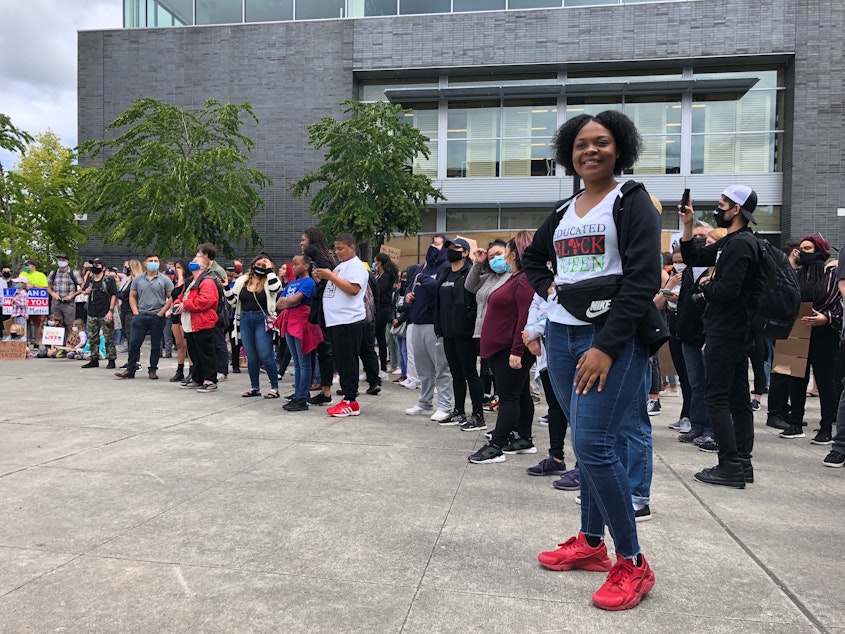
In the fight for equality, young People of Color in Burien Washington say their city can be a model for other communities
KUOW reporter Joshua McNichols went to the protests in Burien, which had a different atmosphere than those in Seattle. Bill Radke interviewed Joshua about what he saw.
BR: What was different about the Burien protests?
JM: Let me set the scene first. There's a youth-led march on City Hall, then a rally where young Black men and women spoke of systematic racism that's holding them back. A young Black poet named Charleisha Cox performed a spoken word piece ending with "I can't breathe. I won't breathe until a change has been made. So please don't mistake my passion for aggression, like how you've mistaken my culture for your fashion."
As she's speaking, the police are there too. But they're not armed with pepper spray and flash bangs, they're mingling with the crowd. The police chief is there too, like it's a backyard barbecue. I asked this poet about the presence of the police. She told me "Usually you have the police working against you but here we had them helping us and blocking off streets and helping us make sure that we’re safe and that we’re peaceful – so they’re showing that they’re really here to protect us and that gives us a little hope.”

Sponsored
BR: So is this a common thing for people to say in Burien?
JM: Yeah! And one reason is that many young people told me that in Burien, politicians listen to them. Samatar Hashi, a young Black man, told me how close he and his friends are to elected leaders. "We know their names. We know them. And they help us whenever we need help."
Daija Tramble told me “I feel like they care – they really do care. I have an internship at the city of Burien – they let me in their office, and they really listen to youth voices because they know we are the future.”
Amrit Singh told me “It’s just amazing to see this – I mean, you don’t see this type of influence – you don’t see this type of youth influence anywhere else in the area.”
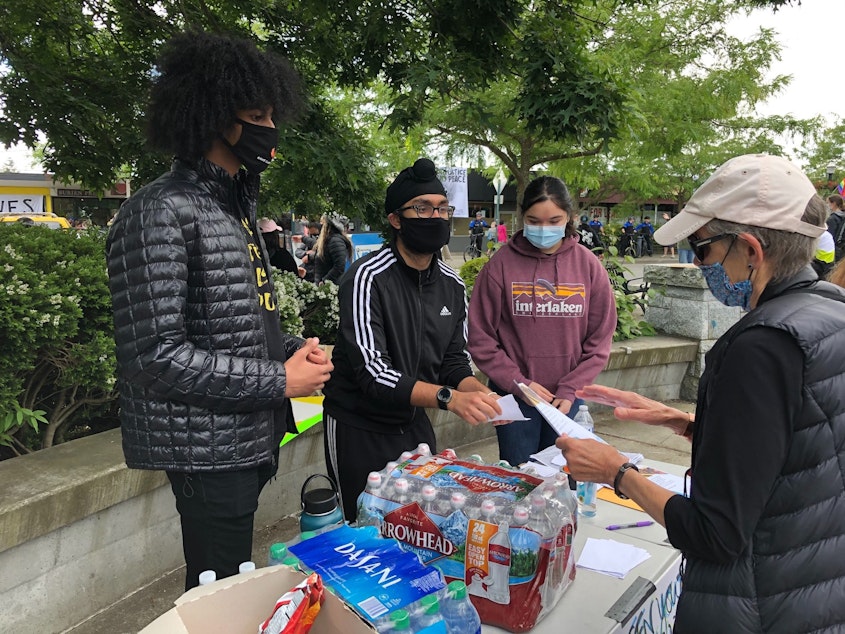
Sponsored
BR: How did Burien achieve this?
JM: Young people got organized after a couple youths were shot in what the sheriff describes as a gang incident and they started pushing for political change. Now, they help elect leaders, knocking on doors even when they’re too young to vote. And they tell me those leaders listen in return.
One leader they talk about with admiration is their mayor, Jimmy Matta. He a Latino man with a day job as a construction worker. At the rally after the march, the mayor helped set up audio equipment, and then stood in the front row, clapping for every speaker.
He’s had a lot of hardship in his life, he’s even been the victim of a hate crime, but he’s also quick to call out his own privilege, compared to the Black community members speaking. “There’s some things that – even though I’m a person of color – I’m not an African American – and I haven’t seen those struggles – so I have to make sure that I’m listening,” he said.
BR: So you’ve shown us young people – who are helping elect leaders in Burien that they can look up to. Do older people in Burien have that same sense of connection?
Sponsored
JM: I wanted to know this too, so I went around asking. A Burien-based music producer named Beezie 2000 told me “When I first came out here there wasn’t a lot of Black people out here. You know, and so it was a lot of harassment by the police. I was harassed constantly.”
He moved to Burien about 15 years ago, so he’s a little older, closer to my age. After the rally at City Hall, I found him and a rapper named Darryl King Jr (who raps as TNT, The Natural Truth). They were praising the event but challenged the mayor on the positive relationship with police that he’s selling. King is a contemporary of Sir Mix A-Lot - they were once in a video together – so he’s also a generation older than the youths we’ve been hearing from today.
King said would have liked to see more outreach to the Black community for the event. “A lot of Black people are not coming out because it’s still a touchy subject for us, it’s still emotional,” he said. “When people get up, they start crying, they start screaming because it’s emotional.”
“Right now, it just feels like we’re telling stories,” King said, “'Tell the black story, tell the black story.' But you guys know the story. We’re getting killed, we’re getting shot, it’s the same difference.”
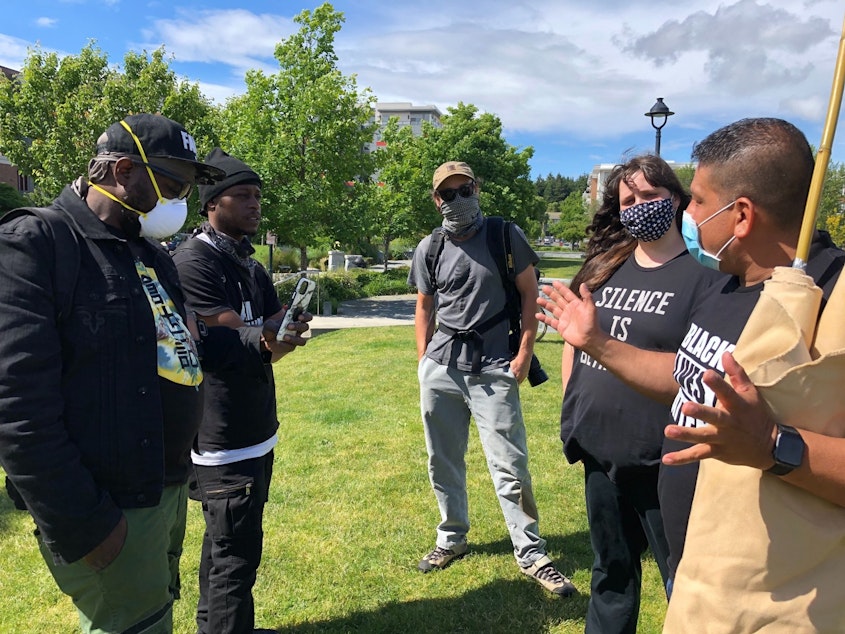
Sponsored
The two men mentioned some specific grievances. The mayor asked them to send an email. “If you hear of someone from the community saying they’ve been wronged, we want to hear it” Matta told them.
“But we have a problem with that too,” Beezie 2000 responded. “Because we’ve been done wrong, so much and nothing’s happened, so many times, that we definitely have a problem telling, saying ‘Hey, the police did this to me.’”
Then Darryl King Jr said “You’ve got to understand when you grow up in a code of life of where we don’t trust you, we don’t talk to you, it’s no snitching, we’re not saying nothing – we have to unembed that from us now because, now it’s like, okay now you want us to say something. And it’s like ‘How can we trust you to say something? You know? If I don’t say nothing I die, if I do say something I die, what’s the point? How can I guarantee you if I say something about what these people are doing, my life isn’t going to be in danger?”
Mayor Matta didn’t have an answer to that. And he didn’t have answers to some of King’s questions about why there aren’t more Black people living on the nice shoreline properties in Burien, or why King’s parents have worked two jobs and still live in an apartment, or why King had to borrow gas money to attend this event and barely has enough income to feed his kids.
But Matta did offer to help King find more business for his cleaning business, which is his day job. And he asked the producer Beezie 2000 to join a city committee. Because he says his goal, beyond representing people as much as he can as a person of color, is to turn their frustration into better legislation, better governance.
Sponsored
BR: Do you have an example of what kind of legislation?
JM: Nothing specific is coming up right now, but Matta’s been working on related issues since he was elected 3 years ago. One of the first things he did when he got into office was hire a new police chief. The old one was retiring. And they looked specifically for someone who was really focused on listening to the community.
Matta says the city has been working hard to hire more police of color, especially bilingual cops. That’s been hard because they get recruited to California as soon as he hires them. So he’s trying to hire directly from Burien and nearby, in hopes that people stay rooted.
But he said he learned something this weekend, from the march and the rally. After the two men told him they hadn’t heard about the event until the last minute, he said he realized he needs to do more to bring African Americans to the table. And that means courting them to get involved with government as aggressively as he has courted young people.
BR: Later in the day you went to Magnuson Park in Seattle. How did it compare to Burien?
JM: At Magnuson Park, people were putting on plastic goggles in anticipation of pepper spray. It was a totally different relationship with police in Seattle.
The protests there did not end in tear gas or pepper spray, like they have at other Seattle protests, but the protesters were definitely geared up for it, you know.
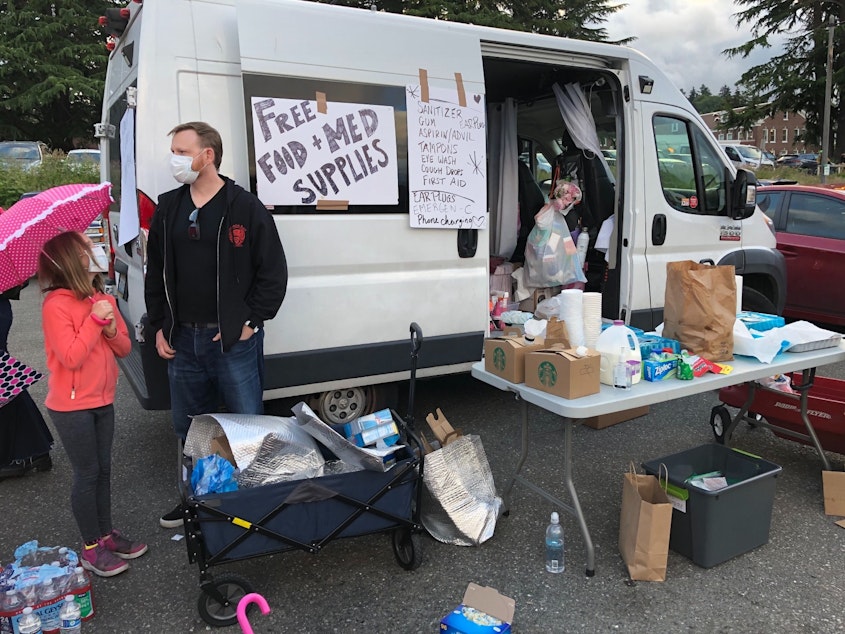
The point is that in Seattle, there is not such trust between youth and police as I witnessed in Burien. And I didn't hear calls to dismantle the police in Burien either.
And it’s not that there haven’t been incidents of police violence there. Like when a Sherriff’s deputy shot and killed a young man in 2017 who they thought had a knife, but it was just a pen.
But for some reason, the youths in Burien tell me their city has a less antagonistic relationship between police and the community they’re sworn to protect, and many of them call it a model for other cities.
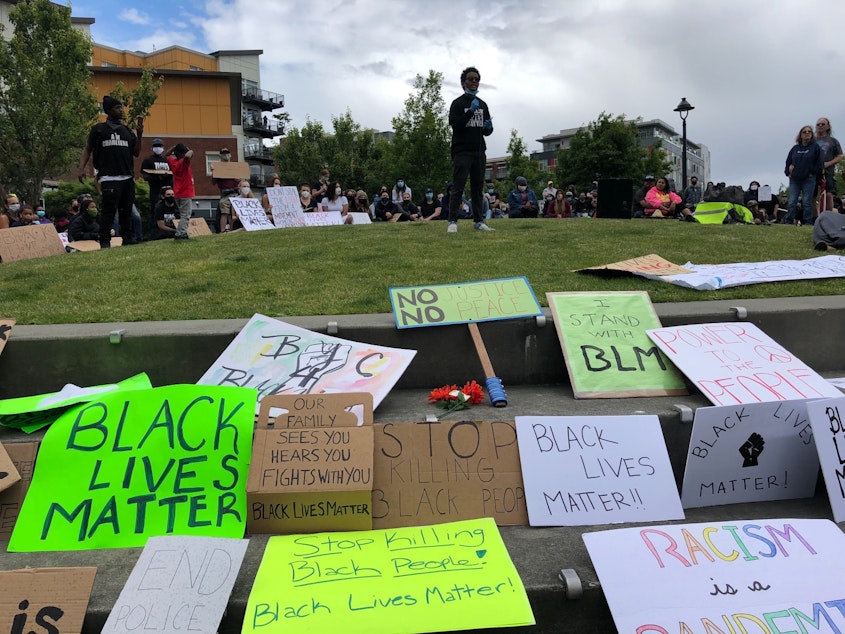
BR: Could some of it be that it’s a smaller town?
JM: Yeah, totally. But it seems like maybe small towns like Burien have something to teach big cities. Like: reform has to start with deep listening.


